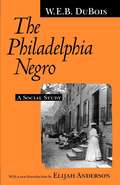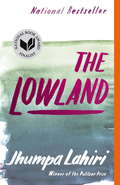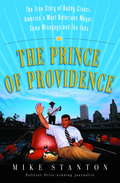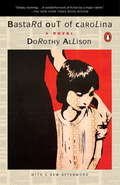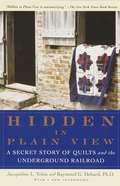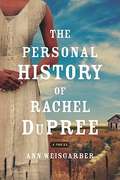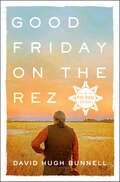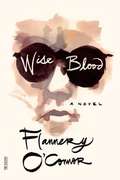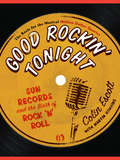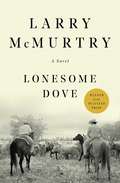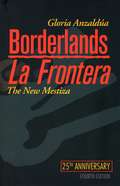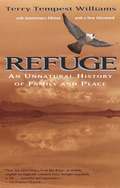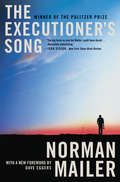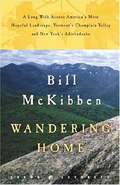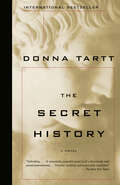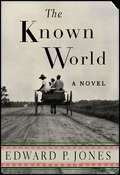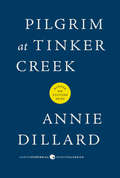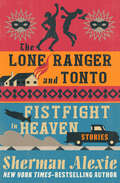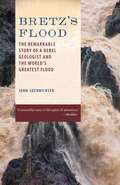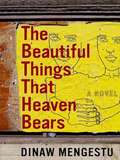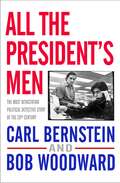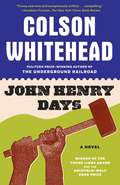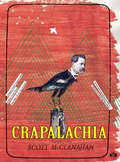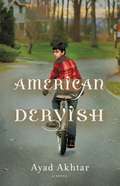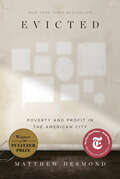Special Collections
Road Trip
Description: Nothing says freedom and adventure like a road trip! From Alabama to Wyoming, we have reads for every state. So hitch a ride with this collection of fiction and nonfiction books. #adults
- Table View
- List View
The Philadelphia Negro
by Elijah Anderson and W. E. B. Du BoisIn 1897 the promising young sociologist William Edward Burghardt Du Bois (1868-1963) was given a temporary post as Assistant in Sociology at the University of Pennsylvania in order to conduct in-depth studies of the Negro community in Philadelphia.
The product of those studies was the first great empirical book on the Negro in American society.
More than one hundred years after its original publication by the University of Pennsylvania Press, The Philadelphia Negro remains a classic work.
It is the first, and perhaps still the finest, example of engaged sociological scholarship--the kind of work that, in contemplating social reality, helps to change it.
In his introduction, Elijah Anderson examines how the neighborhood studied by Du Bois has changed over the years and compares the status of blacks today with their status when the book was initially published.
The Lowland
by Jhumpa LahiriTwo brothers bound by tragedy; a fiercely brilliant woman haunted by her past; a country torn by revolution: the Pulitzer Prize winner and #1 New York Times bestselling author gives us a powerful new novel--set in both India and America--that explores the price of idealism, and a love that can last long past death.
Growing up in Calcutta, born just fifteen months apart, Subhash and Udayan Mitra are inseparable brothers, one often mistaken for the other. But they are also opposites, with gravely different futures ahead of them.
It is the 1960s, and Udayan--charismatic and impulsive--finds himself drawn to the Naxalite movement, a rebellion waged to eradicate inequity and poverty: he will give everything, risk all, for what he believes.
Subhash, the dutiful son, does not share his brother's political passion; he leaves home to pursue a life of scientific research in a quiet, coastal corner of America.
But when Subhash learns what happened to his brother in the lowland outside their family's home, he comes back to India, hoping to pick up the pieces of a shattered family, and to heal the wounds Udayan left behind--including those seared in the heart of his brother's wife.
Suspenseful, sweeping, piercingly intimate, The Lowland expands the range of one of our most dazzling storytellers, seamlessly interweaving the historical and the personal across generations and geographies.
This masterly novel of fate and will, exile and return, is a tour de force and an instant classic.
Shortlisted for the 2013 Man Booker Prize
The Prince of Providence
by Mike StantonCOP: "Buddy, I think this is a whorehouse."
BUDDY CIANCI: "Now I know why they made you a detective."
Welcome to Providence, Rhode Island, where corruption is entertainment and Mayor Buddy Cianci presided over the longest-running lounge act in American politics.
In The Prince of Providence, Pulitzer Prize-winning journalist Mike Stanton tells a classic story of wiseguys, feds, and politicians on a carousel of crime and redemption.
Buddy Cianci was part urban visionary, part Tony Soprano--a flawed political genius in the mold of Huey Long and James Michael Curley. His lust for power cost him his marriage, his family, and close friendships.
Yet he also revitalized the city of Providence, where ethnic factions jostle with old-moneyed New Englanders and black-clad artists from the Rhode Island School of Design rub shoulders with scam artists from City Hall.
For nearly a quarter of a century, Cianci dominated this uneasy melting pot. During his first administration, twenty-two political insiders were convicted of corruption.
In 1984, Cianci resigned after pleading guilty to felony assault, for torturing a man he suspected of sleeping with his estranged wife.
In 1990, in a remarkable comeback, Cianci was elected mayor once again; he went on to win national acclaim for transforming a dying industrial city into a trendy arts and tourism mecca.
But in 2001, a federal corruption probe dubbed Operation Plunder Dome threatened to bring the curtain down on Cianci once and for all. Mike Stanton takes readers on a remarkable journey through the underside of city life, into the bizarre world of the mayor and his supporting cast, including:
* "Buckles" Melise, the city official in charge of vermin control, who bought Providence twice as much rat poison as the city of Cleveland, which was at the time four times as large, and wound up increasing Providence's rat population. During a garbage strike, Buckles sledgehammered one city employee and stuck his thumb in another's eye. Cianci would later describe this as "great public policy."
* Anthony "the Saint" St. Laurent, a major Rhode Island bookmaker and loan shark, who tried to avoid prison by citing his medical need for forty bowel irrigations a day, thus earning himself the nickname "Public Enema Number One."
* Dennis Aiken, a celebrated FBI agent and public corruption expert, who asked to be sent to "the Louisiana of the North," where he enlisted an undercover businessman to expose the corrupt secrets of Cianci's City Hall.
The Prince of Providence is a colorful and engrossing account of one of the most tragicomic figures in modern American life--and the city he transformed.
Bastard Out of Carolina
by Dorothy AllisonThe publication of Dorothy Allison's Bastard Out of Carolina was a landmark event. The novel's profound portrait of family dynamics in the rural South won the author a National Book Award nomination and launched her into the literary spotlight. Critics have likened Allison to William Faulkner, Flannery O'Connor, and Harper Lee, naming her the first writer of her generation to dramatize the lives and language of poor whites in the South.
Since its appearance, the novel has inspired an award-winning film and has been banned from libraries and classrooms, championed by fans, and defended by critics.
Greenville County, South Carolina, is a wild, lush place that is home to the Boatwright family-a tight-knit clan of rough-hewn, hard- drinking men who shoot up each other's trucks, and indomitable women who get married young and age too quickly.
At the heart of this story is Ruth Anne Boatwright, known simply as Bone, a bastard child who observes the world around her with a mercilessly keen perspective. When her stepfather Daddy Glen, "cold as death, mean as a snake," becomes increasingly more vicious toward her, Bone finds herself caught in a family triangle that tests the loyalty of her mother, Anney-and leads to a final, harrowing encounter from which there can be no turning back.
Hidden in Plain View
by Jacqueline L. Tobin and Raymond G. DobardThe fascinating story of a friendship, a lost tradition, and an incredible discovery, revealing how enslaved men and women made encoded quilts and then used them to navigate their escape on the Underground Railroad. In Hidden in Plain View, historian Jacqueline Tobin and scholar Raymond Dobard offer the first proof that certain quilt patterns, including a prominent one called the Charleston Code, were, in fact, essential tools for escape along the Underground Railroad. In 1993, historian Jacqueline Tobin met African American quilter Ozella Williams amid piles of beautiful handmade quilts in the Old Market Building of Charleston, South Carolina. With the admonition to "write this down," Williams began to describe how slaves made coded quilts and used them to navigate their escape on the Underground Railroad. But just as quickly as she started, Williams stopped, informing Tobin that she would learn the rest when she was "ready." During the three years it took for Williams's narrative to unfold—and as the friendship and trust between the two women grew—Tobin enlisted Raymond Dobard, Ph.D., an art history professor and well-known African American quilter, to help unravel the mystery.Part adventure and part history, Hidden in Plain View traces the origin of the Charleston Code from Africa to the Carolinas, from the low-country island Gullah peoples to free blacks living in the cities of the North, and shows how three people from completely different backgrounds pieced together one amazing American story.With a new afterword. Illlustrations and photographs throughout, including a full-color photo insert.
The Personal History of Rachel DuPree
by Ann Weisgarber
It is 1917 in the South Dakota Badlands, and summer has been hard.
Fourteen years have passed since Rachel and Isaac DuPree left Chicago to stake a claim in this unforgiving land.
Isaac, a former Buffalo Soldier, is fiercely proud: black families are rare in the West, and black ranchers even rarer.
But it hasn't rained in months, the cattle bellow with thirst, and supplies are dwindling.
Pregnant, and struggling to feed her family, Rachel is isolated by more than just geography.
She is determined to give her surviving children the life they deserve, but she knows that her husband will never leave his ranch.
Moving and majestic, The Personal History of Rachel DuPree is an unforgettable novel about love and loyalty, homeland and belonging.
Above all, it is the story of one woman's courage in the face of the most punishing adversity.
Short-listed for the Orange Award for New Writers & long-listed for the Orange Prize
Good Friday on the Rez
by David Hugh BunnellGood Friday on the Rez follows the author on a one-day, 280-mile round-trip from his boyhood Nebraska hometown of Alliance to the Pine Ridge Indian Reservation in South Dakota, where he reconnects with his longtime friend and blood brother, Vernell White Thunder. In a compelling mix of personal memoir and recent American Indian history, David Hugh Bunnell debunks the prevalent myth that all is hopeless for these descendants of Crazy Horse, Red Cloud, and Sitting Bull and shows how the Lakota people have recovered their pride and dignity and why they will ultimately triumph.What makes this narrative special is Bunnell's own personal experience of close to forty years of friendships and connections on the Rez, as well as his firsthand exposure to some of the historic events. When he lived on Pine Ridge at the same time of the American Indian Movement's seventy-one-day siege at Wounded Knee in 1973, he met Russell Means and got a glimpse behind the barricades. Bunnell has also seen the more recent cultural resurgence firsthand, attending powwows and celebrations, and even getting into the business of raising a herd of bison.Substantive and raw, Good Friday on the Rez is for readers who care about the historical struggles and the ongoing plight of Native Americans, and in particular, that of the Lakota Sioux, who defeated the U.S. Army twice, and whose leaders have become recognized as among America's greatest historical figures.Good Friday on the Rez is a dramatic page-turner, an incredible true story that tracks the torment and miraculous resurrection of Native American pride, spirituality, and culture—how things got to be the way they are, where they are going, and why we should care.
Wise Blood
by Flannery O'ConnorFlannery O'Connor's haunting first novel of faith, false prophets, and redemptive wisdom Wise Blood, Flannery O'Connor's astonishing and haunting first novel, is a classic of twentieth-century literature.
It is the story of Hazel Motes, a twenty-two-year-old caught in an unending struggle against his inborn, desperate fate.
He falls under the spell of a "blind" street preacher named Asa Hawks and his degenerate fifteen-year-old daughter, Sabbath Lily.
In an ironic, malicious gesture of his own non-faith, and to prove himself a greater cynic than Hawks, Motes founds the Church Without Christ, but is still thwarted in his efforts to lose God.
He meets Enoch Emery, a young man with "wise blood," who leads him to a mummified holy child and whose crazy maneuvers are a manifestation of Motes's existential struggles.
This tale of redemption, retribution, false prophets, blindness, blindings, and wisdom gives us one of the most riveting characters in American fiction.
Good Rockin' Tonight
by Colin Escott and Martin HawkinsRock 'n' roll was born in Memphis in the tiny storefront recording studio of Sun Records.
This is the definitive account of how it happened! Sam Phillips's credo was: "If you're not doing something different, you're not doing anything."
If he had done no more than discover Elvis Presley and produce his first five singles he would still be the godfather of rock 'n' roll. But he did more.
Much more. While Elvis was still sitting on the edge of his bed listening to the radio and figuring out guitar chords, Phillips was discovering and recording blues giants like B.B. King, Howling Wolf, and Ike Turner.
During the few months that Elvis was with Sun Records, Phillips found Johnny Cash and Carl Perkins. Soon after, he found Jerry Lee Lewis, Roy Orbison, and Charlie Rich.
And he did it almost singlehandedly--from his two-room studio in Memphis, Tennessee.
Phillips's story, which Colin Escott tells in beautiful detail, is more than a catalog of hits.
Without Sun's philosophy of experimentation, innovation, and genre transcendence, the musical revolution could have never begun.
Lonesome Dove
by Larry McmurtryA love story, an adventure, and an epic of the frontier, Larry McMurtry's Pulitzer Prize-- winning classic, Lonesome Dove, the third book in the Lonesome Dove tetralogy, is the grandest novel ever written about the last defiant wilderness of America.
Journey to the dusty little Texas town of Lonesome Dove and meet an unforgettable assortment of heroes and outlaws, whores and ladies, Indians and settlers.
Richly authentic, beautifully written, always dramatic, Lonesome Dove is a book to make us laugh, weep, dream, and remember.
Borderlands / La Frontera
by Gloria Anzaldúa and Aída Hurtado and Norma CantuRooted in Gloria Anzaldúa's experience as a Chicana, a lesbian, an activist, and a writer, the essays and poems in this volume profoundly challenged, and continue to challenge, how we think about identity.
Borderlands / La Frontera remaps our understanding of what a "border" is, presenting it not as a simple divide between here and there, us and them, but as a psychic, social, and cultural terrain that we inhabit, and that inhabits all of us.
This twenty-fifth anniversary edition features a new introduction by scholars Norma Cantú (University of Texas at San Antonio) and Aída Hurtado (University of California at Santa Cruz) as well as a revised critical bibliography.
Gloria Anzaldúa was a Chicana-tejana-lesbian-feminist poet, theorist, and fiction writer from south Texas. She was the editor of the critical anthology Making Face/Making Soul: Haciendo Caras (Aunt Lute Books, 1990), co-editor of This Bridge Called My Back: Writings by Radical Women of Color, and winner of the Before Columbus Foundation American Book Award. She taught creative writing, Chicano studies, and feminist studies at University of Texas, San Francisco State University, Vermont College of Norwich University, and University of California Santa Cruz.
Anzaldúa passed away in 2004 and was honored around the world for shedding visionary light on the Chicana experience by receiving the National Association for Chicano Studies Scholar Award in 2005. Gloria was also posthumously awarded her doctoral degree in literature from the University of California, Santa Cruz. A number of scholarships and book awards, including the Anzaldúa Scholar Activist Award and the Gloria E. Anzaldúa Award for Independent Scholars, are awarded in her name every year.
The Executioner's Song
by Norman Mailer and Dave EggersArguably the greatest book from America's most heroically ambitious writer, THE EXECUTIONER'S SONG follows the short, blighted life of Gary Gilmore who became famous after he robbed two men in 1976 and killed them in cold blood.
After being tried and convicted, he immediately insisted on being executed for his crime. To do so, he fought a system that seemed intent on keeping him alive long after it had sentenced him to death. And that fight for the right to die is what made him famous.
Mailer tells not only Gilmore's story, but those of the men and women caught in the web of his life and drawn into his procession toward the firing squad. All with implacable authority, steely compassion, and a restraint that evokes the parched landscape and stern theology of Gilmore's Utah.
THE EXECUTIONER'S SONG is a trip down the wrong side of the tracks to the deepest source of American loneliness and violence. It is a towering achievement-impossible to put down, impossible to forget.
Pulitzer Prize Winner
Wandering Home
by Bill MckibbenThe acclaimed author of The End of Nature takes a three-week walk from his current home in Vermont to his former home in the Adirondacks and reflects on the deep hope he finds in the two landscapes.
Bill McKibben begins his journey atop Vermont's Mt. Abraham, with a stunning view to the west that introduces us to the broad Champlain Valley of Vermont, the expanse of Lake Champlain, and behind it the towering wall of the Adirondacks.
"In my experience," McKibben tells us, "the world contains no finer blend of soil and rock and water and forest than that found in this scene laid out before me--a few just as fine, perhaps, but none finer. And no place where the essential human skills--cooperation, husbandry, restraint--offer more possibility for competent and graceful inhabitation, for working out the answers that the planet is posing in this age of ecological pinch and social fray."
The region he traverses offers a fine contrast between diverse forms of human habitation and pure wilderness.
On the Vermont side, he visits with old friends who are trying to sustain traditional ways of living on the land and to invent new ones, from wineries to biodiesel. After crossing the lake in a rowboat, he backpacks south for ten days through the vast Adirondack woods.
As he walks, he contemplates the questions that he first began to raise in his groundbreaking meditation on climate change, The End of Nature: What constitutes the natural? How much human intervention can a place stand before it loses its essence? What does it mean for a place to be truly wild?
Wandering Home is a wise and hopeful book that enables us to better understand these questions and our place in the natural world. It also represents some of the best nature writing McKibben has ever done.
The Secret History
by Donna TarttA READ WITH JENNA BOOK CLUB PICK • ONE OF TIME MAGAZINE'S 100 BEST MYSTERY AND THRILLER BOOKS OF ALL TIME • INTERNATIONAL BESTSELLER • A contemporary literary classic and "an accomplished psychological thriller ... absolutely chilling" (Village Voice), from the Pulitzer Prize–winning author of The Goldfinch.One of The Atlantic&’s Great American Novels of the Past 100 YearsUnder the influence of a charismatic classics professor, a group of clever, eccentric misfits at a New England college discover a way of thought and life a world away from their banal contemporaries. But their search for the transcendent leads them down a dangerous path, beyond human constructs of morality.&“A remarkably powerful novel [and] a ferociously well-paced entertainment . . . Forceful, cerebral, and impeccably controlled.&” —The New York Times
The Known World
by Edward P. JonesIn one of the most acclaimed novels in recent memory, Edward P. Jones, two-time National Book Award finalist, tells the story of Henry Townsend, a black farmer and former slave who falls under the tutelage of William Robbins, the most powerful man in Manchester County, Virginia.
Making certain he never circumvents the law, Townsend runs his affairs with unusual discipline.
But when death takes him unexpectedly, his widow, Caldonia, can't uphold the estate's order and chaos ensues.
In a daring and ambitious novel, Jones has woven a footnote of history into an epic that takes an unflinching look at slavery in all of its moral complexities.
This P.S. edition features an extra 16 pages of insights into the book, including author interviews, recommended reading, and more.
Pilgrim at Tinker Creek
by Annie DillardPilgrim at Tinker Creek is the story of a dramatic year in Virginia's Blue Ridge valley.
Annie Dillard sets out to see what she can see. What she sees are astonishing incidents of "mystery, death, beauty, violence."
The Lone Ranger and Tonto Fistfight in Heaven
by Sherman AlexieSherman Alexie&’s darkly humorous story collection weaves memory, fantasy, and stark reality to powerfully evoke life on the Spokane Indian Reservation. The twenty-four linked tales in Alexie&’s debut collection—an instant classic—paint an unforgettable portrait of life on and around the Spokane Indian Reservation, a place where &“Survival = Anger x Imagination,&” where HUD houses and generations of privation intertwine with history, passion, and myth. We follow Thomas Builds-the-Fire, the longwinded storyteller no one really listens to; his half-hearted nemesis, Victor, the basketball star turned recovering alcoholic; and a wide cast of other vividly drawn characters on a haunting journey filled with humor and sorrow, resilience and resignation, dreams and reality. Alexie&’s unadulterated honesty and boundless compassion come together in a poetic vision of a world in which the gaps between past and present are not really gaps after all. The basis for the acclaimed 1998 feature film Smoke Signals,the Chicago Tribune noted, &“The Lone Ranger and Tonto Fistfight in Heaven . . . is for the American Indian what Richard Wright&’s Native Son was for the black American in 1940.&” The collection received a Special Citation for the PEN/Hemingway Award for Best First Fiction. This ebook edition features a new prologue from the author, as well as an illustrated biography and rare photos from Sherman Alexie&’s personal collection.
Bretz's Flood
by John SoennichsenThe land between Idaho and the Cascade Mountains is characterized by gullies, coulees, and deserts--in geologic terms, it is a wholly unique place on the earth.
Legendary geologist J Harlen Bretz, starting in the 1920s, was the first to explore the area.
Bretz, a former science teacher at Franklin High School in Seattle and then a professor at the University of Washington and later the University of Chicago, eventually formed the theory that the land was scoured in a virtual instant by a massive flood.
His original thinking was rewarded with various forms of public and academic humiliation.
In the mid-twentieth century, his theory sounded a bit too much like the biblical flood, and the scientific world wanting nothing to do with that sort of idea. (Ironically, Bretz was an avowed atheist, so this was hardly his inspiration.)
Bretz's Flood tells the dramatic story of this scientific maverick-how he came to study the region, his radical theory that a huge flood created it, and how the mainstream geologic community campaigned to derail him from pursuing an idea that satellite photos would confirm decades later.
The Beautiful Things that Heaven Bears
by Dinaw Mengestu
Seventeen years ago, Sepha Stephanos fled the Ethiopian Revolution for a new start in the United States.
Now he finds himself running a failing grocery store in a poor African-American section of Washington, D. C. , his only companions two fellow African immigrants who share his bitter nostalgia and longing for his home continent.
Years ago and worlds away Sepha could never have imagined a life of such isolation. As his environment begins to change, hope comes in the form of a friendship with new neighbors Judith and Naomi, a white woman and her biracial daughter.
But when a series of racial incidents disturbs the community, Sepha may lose everything all over again.
A literary debut hailed by The New York Times Book Review as a great American novel. Awards Include:
Finalist for the Young Lions Fiction Award
Finalist for the Los Angeles Times Book Prize for First Fiction
Winner of the Guardian First Book Prize
New York Times Notable Book
Winner of the National Book Foundation's "5 Under 35" Award
Recipient of a Lannan Literary Fellowship
Winner of the Prix du Premier Roman
Named the Seattle Reads Selection of 2008
All the President's Men
by Bob Woodward and Carl BernsteinIn the most devastating political detective story of the century, two Washington Post reporters, whose brilliant, Pulitzer Prize-winning investigation smashed the Watergate scandal wide open, tell the behind-the-scenes drama the way it really happened.
Beginning with the story of a simple burglary at Democratic headquarters and then continuing with headline after headline, Bernstein and Woodward kept the tale of conspiracy and the trail of dirty tricks coming -- delivering the stunning revelations and pieces in the Watergate puzzle that brought about Nixon's scandalous downfall.
Their explosive reports won a Pulitzer Prize for The Washington Post and toppled the President. This is the book that changed America.
John Henry Days
by Colson WhiteheadColson Whitehead’s eagerly awaited and triumphantly acclaimed new novel is on one level a multifaceted retelling of the story of John Henry, the black steel-driver who died outracing a machine designed to replace him.
On another level it’s the story of a disaffected, middle-aged black journalist on a mission to set a record for junketeering who attends the annual John Henry Days festival.
It is also a high-velocity thrill ride through the tunnel where American legend gives way to American pop culture, replete with p. r. flacks, stamp collectors, blues men , and turn-of-the-century song pluggers.
John Henry Days is an acrobatic, intellectually dazzling, and laugh-out-loud funny book that will be read and talked about for years to come.
Crapalachia
by Scott McClanahanWhen Scott McClanahan was fourteen he went to live with his Grandma Ruby and his Uncle Nathan, who suffered from cerebral palsy.
Crapalachia is a portrait of these formative years, coming-of-age in rural West Virginia.
Peopled by colorful characters and their quirky stories, Crapalachia interweaves oral folklore and area history, providing an ambitious and powerful snapshot of overlooked Americana.
American Dervish
by Ayad AkhtarHayat Shah is a young American in love for the first time. His normal life of school, baseball, and video games had previously been distinguished only by his Pakistani heritage and by the frequent chill between his parents, who fight over things he is too young to understand. Then Mina arrives, and everything changes.
Mina is Hayat's mother's oldest friend from Pakistan. She is independent, beautiful and intelligent, and arrives on the Shah's doorstep when her disastrous marriage in Pakistan disintegrates. Even Hayat's skeptical father can't deny the liveliness and happiness that accompanies Mina into their home. Her deep spirituality brings the family's Muslim faith to life in a way that resonates with Hayat as nothing has before. Studying the Quran by Mina's side and basking in the glow of her attention, he feels an entirely new purpose mingled with a growing infatuation for his teacher.
When Mina meets and begins dating a man, Hayat is confused by his feelings of betrayal. His growing passions, both spiritual and romantic, force him to question all that he has come to believe is true. Just as Mina finds happiness, Hayat is compelled to act -- with devastating consequences for all those he loves most.
American Dervish is a brilliantly written, nuanced, and emotionally forceful look inside the interplay of religion and modern life. Ayad Akhtar was raised in the Midwest himself, and through Hayat Shah he shows readers vividly the powerful forces at work on young men and women growing up Muslim in America. This is an intimate, personal first novel that will stay with readers long after they turn the last page.
Evicted
by Matthew DesmondNEW YORK TIMES BESTSELLER • WINNER OF THE PULITZER PRIZE • ONE OF TIME&’S TEN BEST NONFICTION BOOKS OF THE DECADE • ONE OF THE NEW YORK TIMES&’S 100 BEST BOOKS OF THE 21ST CENTURY One of the most acclaimed books of our time, this modern classic &“has set a new standard for reporting on poverty&” (Barbara Ehrenreich, The New York Times Book Review).In Evicted, Princeton sociologist and MacArthur &“Genius&” Matthew Desmond follows eight families in Milwaukee as they each struggle to keep a roof over their heads. Hailed as &“wrenching and revelatory&” (The Nation), &“vivid and unsettling&” (New York Review of Books), Evicted transforms our understanding of poverty and economic exploitation while providing fresh ideas for solving one of twenty-first-century America&’s most devastating problems. Its unforgettable scenes of hope and loss remind us of the centrality of home, without which nothing else is possible. A BEST BOOK OF THE YEAR: President Barack Obama, The New York Times Book Review, The Boston Globe, The Washington Post, NPR, Entertainment Weekly, The New Yorker, Bloomberg, Esquire, BuzzFeed, Fortune, San Francisco Chronicle, Milwaukee Journal Sentinel, St. Louis Post-Dispatch, Politico, The Week, Chicago Public Library, BookPage, Kirkus Reviews, Library Journal, Publishers Weekly, Booklist, Shelf AwarenessWINNER OF: The National Book Critics Circle Award for Nonfiction • The PEN/John Kenneth Galbraith Award for Nonfiction • The Andrew Carnegie Medal for Excellence in Nonfiction • The Hillman Prize for Book Journalism • The PEN/New England Award • The Chicago Tribune Heartland PrizeFINALIST FOR THE LOS ANGELES TIMES BOOK PRIZE AND THE KIRKUS PRIZE&“Evicted stands among the very best of the social justice books.&”—Ann Patchett, author of Bel Canto and Commonwealth &“Gripping and moving—tragic, too.&”—Jesmyn Ward, author of Salvage the Bones &“Evicted is that rare work that has something genuinely new to say about poverty.&”—San Francisco Chronicle
